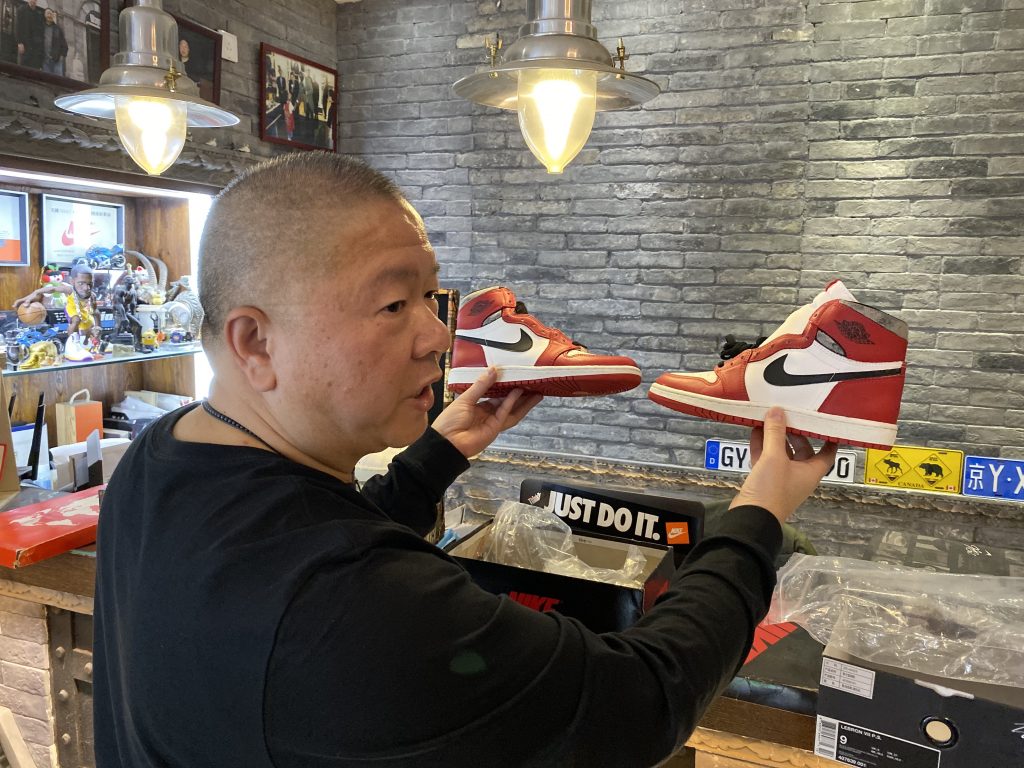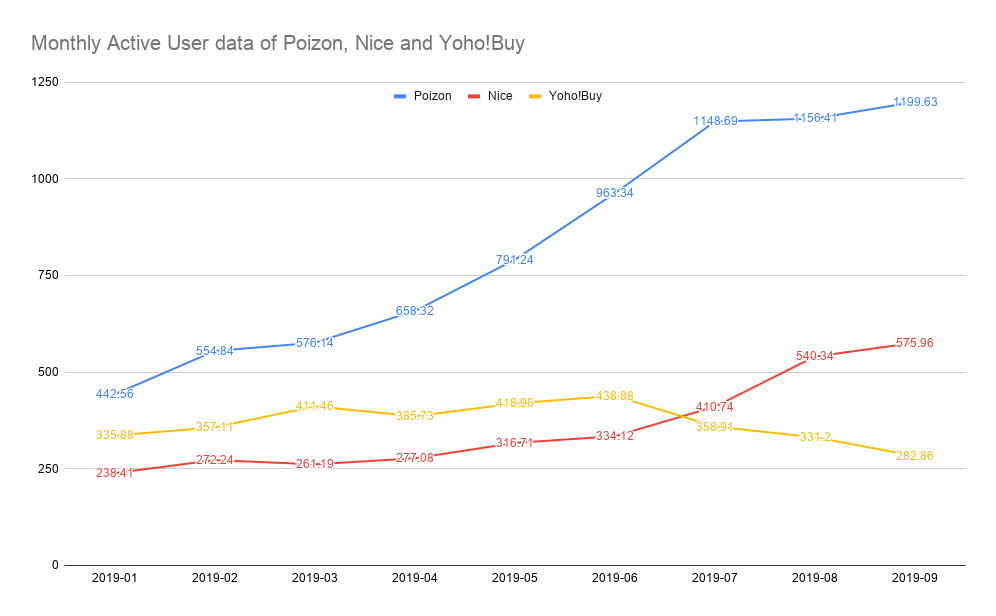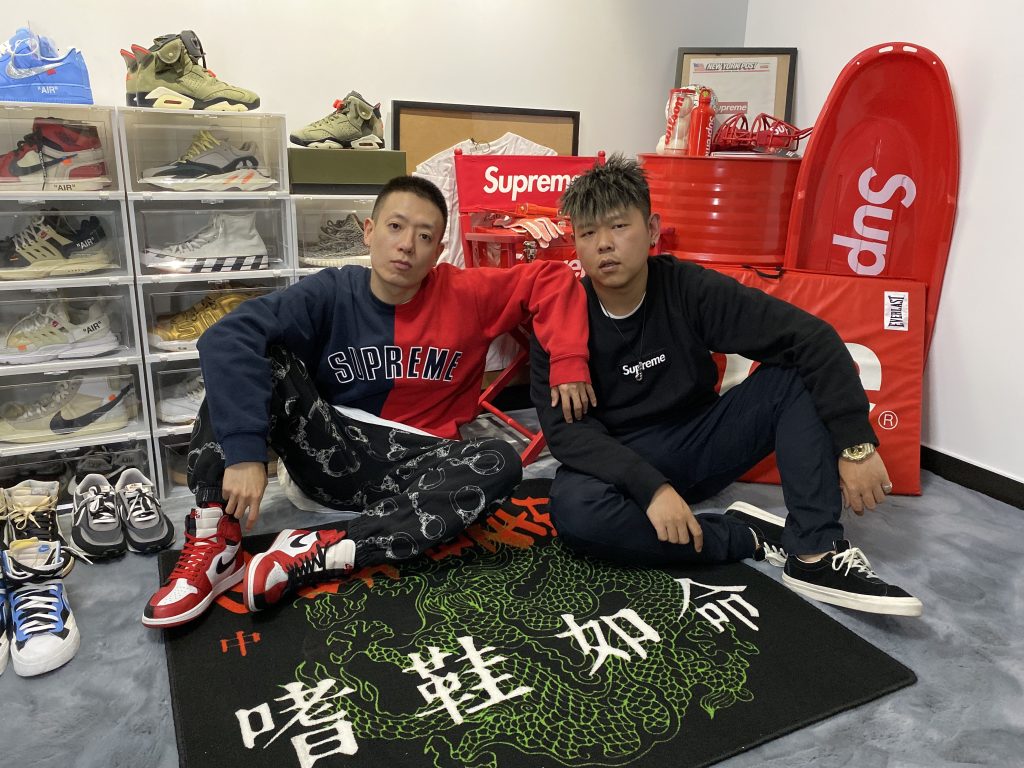On a sunny October morning in 2019, 19-year-old Beijing sophomore Liu Haoyu skipped classes again.
He was waiting with a young crowd outside a trendy sneaker shop at the Beijing’s Workers’ Stadium, in the heart of the upmarket Sanlitun shopping district, for the release of new Nike Air Jordan sneakers, designed by US rapper and songwriter Travis Scott. The previous pair of footwear designed by the Houston-born rapper is highly sought after among sneaker fans and sells for up to USD 2,000 in the secondary market.
Liu was not there to buy the sneakers, though. He signed up for the online raffle but didn’t have the luck to make it to the next round, where only a few were selected to partake in an on-site lottery at the shop on the debut day.
He was there to accompany his friend Eager Geng, who was fortunate enough to participate in an offline raffle round at the shop. “I just want to see the sneakers with my own eyes,” Liu said with a smile, explaining why he risked being rebuked by his professors and made a long commute to be at the sale.
A growing shoe dog culture
Liu calls himself a “shoe dog.” To be specific, he identifies himself as an “entry-level shoe dog.”
Shoe Dog is a memoir written by Nike co-founder Phil Knight that was published in 2016. The term also refers to a footwear expert who is dedicated to the shoe-making industry. But in China, it carries a different meaning—it was at first a term of self-mockery for sneaker fans who see themselves as loyal to their footwear as dogs to their masters.
It more or less serves as a characterization for the country’s sneaker collectors now.
Guo Yu, the boss of Yaxin Sports in Beijing, is possibly one of the most famous shoe dogs and a legendary figure in the capital’s sneaker community. His collection consists of hundreds of pairs of sneakers, including a complete set of original Air Jordan signed by NBA legend Michael Jordan.

His low-key sneaker shop, tucked away on a side street running from the main road Dongsi Beidajie, about one mile away from the Forbidden City, the former imperial palace for Chinese emperors and now a tourist attraction, is a haven for the city’s sneakerheads.
Guo has influenced and cultivated generations of Beijing’s sneaker fans. Teens would come in after school and linger until it was time to return home for dinner. “Young people in the past knew inside-out the stories of the sneakers and the players who wore them,” he said.
Kids these days are heavily influenced by celebrities. A pair of sneakers worn by Kris Wu, a Chinese-Canadian millennial idol, could immediately become a sensation that craved by his huge fan base. Online short-video platform Douyin (TikTok’s domestic version in China), where young people sometimes get their styling inspiration, is also flooded with contents with online celebrities showing off sneakers and other fashion items.
Today’s sneaker mania is less about passion for the sport or the shoes per se, but more about profiteering in speculation, Guo said. People queuing up outside his store these days are mostly after the expensive, limited-edition sneakers, and rarely care about their backstories.
“Sneakers are just commodities for young people these days,” he said. “If they wear them, the sneakers are indicators of their wealth. If they don’t wear them and resell those sneakers for profit, they can boast how much they earn from the resales.”
From hobby to speculation gamble
New sneaker releases nowadays attract a much wider audience compared to just two years ago. The crowds outside the sneaker shop at the Workers’ Stadium and Yaxin Sports were a mix of sneaker fans, professional scalpers, curious passers-by, and people who thought they could make a few fast dollars from the footwear speculation game.
A huge resale market for sneakers, especially those with a limited release, emerged in China as the country’s economy progresses.
It started with a few posts on sneaker community forums more than ten years ago, and then, some business-savvy sneaker fans moved their trading to Chinese e-commerce platform Taobao. But the sneaker resale market only really took off in the past two or three years with the emergence of more than ten specialized apps, such as Poizon, Nice, DoNew, and Yoho!Buy.
These apps, serving as online marketplaces and doubling as social hubs for China’s sneaker community, attract nearly 20 million monthly active users in China. Poizon is by far the most popular, with its annual gross merchandise value (GMV) soaring through USD 2 billion in 2018. It closed a Series A+ funding round with DST (Digital Sky Technologies) earlier this year.

Both Liu and Geng, like many of their fellow sneaker fans, closely monitor the latest trading trends on the country’s roster of sneaker apps. The new sneakers that Liu lined up to see—the Travis Scott Air Jordan 6 Retro, with olive green suede uppers, glow-in-the-dark soles, and ankle pouches—saw its prices rise nearly fivefold to more than RMB 8,000 (USD 1,130) on both Poizon and Nice on the day of its release.
“This [sneaker speculation] is a big cake, the dividend of our times, and everyone wants a piece of that cake,” said Eager Geng. He won the lottery to buy the new Travis Scott sneakers at RMB 1,399. Geng has spent more than RMB 40,000 on Nike and Adidas shoes since high school, and he noticed that more people around him began to talk about sneaker speculation in the past few months.
Online media churn out get-rich-overnight stories about college students reaping whopping returns by reselling shoes.
Off-White x Air Jordan 1 Retro High OG “Chicago,” a red, white, and sneaker with half-finished Swooshes stitched to the shoe with Caroline blue thread, was released two years ago at RMB 1,499. It’s now worth more than RMB 25,000 in the resale market. Air Yeezy 2 SP “Red October,” a red sneaker designed by US rapper and entrepreneur Kanye West, was released by Nike in February 2014. At the time of its release, it had an RMB 1,999 price tag. Now, it is one of the most valuable items in the resale market, easily going for more than RMB 90,000.
In one of the most widely circulated urban myths, a young man in his mid-20s who started trading sneakers from his college years earned more than half a million yuan in just one year by trading limited edition sneakers.
Stories like that one are enough to lure people, especially affluent spenders in the Generation Z bracket. In fact, people born after 1995 make up more than 75% of users on Poizon and 88% on Nice. Hot money sloshes around these platforms every day.
Wang Yifei, a veteran sneakerhead who hosts a popular sneaker-focused channel on Douyin, first noticed the influx of fast cash and professional speculators late last year. “These people [the professional speculators], like [traders] in the stock market, come in only to make money. Once they make a profit, they leave,” he said, adding that most investors, like some of the college students who follow his show, lose money in the process.

Over at Yaxin Sports, Guo said most sneakers lose value after their release and only a very tiny part of them enjoy a high premium in the resale market. “What we are seeing now in the market is deceitful prosperity,” he said.
More than half the limited edition sneakers released in the past 12 months are now trading below their original retail prices in the resale market, and only about 10% of shoes see their prices more than double, according to data provided by Nice, the second largest sneaker trading platform in China, to state broadcaster China Central Television (CCTV).
Beijing’s concern
Though hot money may have fueled a frenzy in the sneaker resale market, Zhang Yi, CEO and chief analyst of Guangzhou-based research firm iiMedia, said people should recognize that the appeal of sneaker speculation for many individuals is organic. Especially after China’s housing market downturn and the stock market slump in 2015, followed by the cryptocurrency crackdown in 2017 and the recent peer-to-peer financing crisis, “there aren’t that many good investment options left for individual investors in the market,” Zhang said.
The resale platforms’ over-marketing and over-promise of investment returns, compounded by unrealistic expectations from those after a quick buck in addition to the overall market hype, could lead to a disruption of the normal market order, Zhang cautioned.
“It could be a honey trap for consumers,” said Huang Chuxin, a scholar researching China’s new media landscape at the Chinese Academy of Social Sciences in Beijing. If young people trading sneakers on resale platforms were misled to take on consumer loans for their speculative activities, the government would need to act as the “visible hand” and return the market to rationality, he added.
Chinese policymakers also see the potential dangers that lurk within an overzealous sneaker resale market. In Shanghai, the local branch of the People’s Bank of China warned in mid-October that sneaker speculation could develop into a musical chair game – the once niche hobby amongst sneaker fans is turning into a pump-and-dump scheme with the influx of professional speculators.
Sneakers trading on the platforms gradually are being securitized as a result of the participation from third-party financial institutions that provide financial instruments such as installment payments for speculators.
The regulator’s concern is valid. The rising number of traders who are borrowing to buy and sell sneakers, coupled with the price volatility on the platforms that mirrors a fluctuating stock market, means that a small oversight could eventually lead to another peer-to-peer lending platform crisis.
In a leaked picture of the circular, the central bank asked local financial institutions in Shanghai to be vigilant and take “effective measures” to prevent risks associated with sneaker speculation. What those measures may be, however, was not stated explicitly.
Lately, things have been cooling down.
In late September, Nice banned dozens of accounts suspected of engaging in speculative activities on its platform and issued an open letter from its founder, Alex Zhou, apologizing for the lack of supervision.
“Don’t get into speculation, which is a path of no return, for seeking temporary gains,” the letter read. “It will hurt you as well as others.”
Speculators are transient. Their cash flits from one site to the next with no apparent rhyme or reason. For those who collect blind box toys, a tide of hot money is heading their way.
Additional reporting and video by Yaman Wen and James Chan
